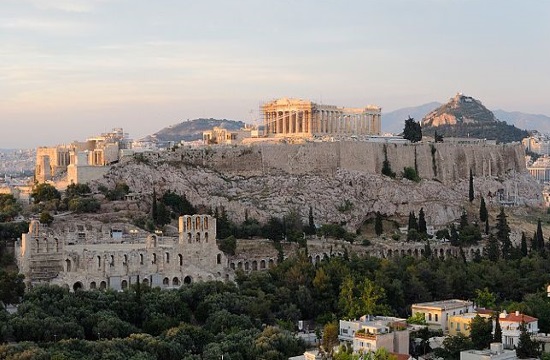.jpg)
Same-sex encounters, especially between men, were common in Greece but that isn’t flying now after a short film showed two men going at it at the Parthenon, where 150 cameras will be installed for surveillance.
The scene was shot in December and set off outrage when it was released online, leading to an investigation by the Culture Ministry. It was also shown at the Aristotle University of Thessaloniki but authorities weren’t alerted until January.
In a sprawling report, the British newspaper The Daily Mail said the incident set off fury from Greek officials with the country trying to lure more filmmakers after making sites such as the Acropolis off-limits for years.
The response has been to put up the CCTV cameras at the UNESCO World Heritage site that will be monitored 24 hours a day although the famed site is closed during the night.
The 36-minute short film, called Xeparthenon – or ‘deflowering’ in Greek – reportedly depicts two men in face coverings having sex at the Erechtheion, a small temple in the Acropolis complex, with tourists walking nearby.
“It was a lewd, terribly lewd act,” Ioannis Mavrikopoulos, the head guard at the Acropolis said. “It marked the most disgraceful affront to the sanctity of the site,” he said, although the paper didn’t say how guards reacted, who they were, if they were stopped, or if the police were called.
Culture Minister Lina Mendoni said the cameras will provide a constant view of any activity at the 2,500-year-old temple in a state-of-the-art high-tech security system with a constant eye watching everyone there.
The Central Archaeological Council authorized the security system on the Acropolis and the monuments of the southern and northern slopes, the cameras to be monitored from a control room, the paper said.
“It’s not just the dangers that the monuments on the site face from vandalism and other activities, but the improper activities that take hold that call for extra security,” Mavrikopoulos said.
THE SACRED ROCKS CAN’T TALK
He told the British newspaper The Times that, “It is an important move in the right direction. We first have to invest in the protection of our cultural heritage. It is a sign of civilization, not an affront to it.”
He urged monitoring of other sites around the country as tourists are returning in hordes during the lingering COVID-19 pandemic.
Others in the film shielded the men from full view by making a circle around them as they had sex, pretending to be taking photographs of the monument although visitors can be seen walking close by.
The filmmakers – who didn’t reveal themselves, said they are LGBT+ activists in a statement and said they chose the Parthenon for its “symbol of nationalism and carrier of hetero-normal messages.”
They said: “Some of us are subject to physical and verbal violence for our choices and expressions of sexuality … we will live our love and sexuality as we wish and we will defend the existence in public, but also the coexistence, of all sexualities that do not violate the self-disposition of our bodies.”
They said having sex between men there was a “political act,” but didn’t explain why if they were so strong in their stance why they wouldn’t identify themselves and take responsibility if they want to assert their rights.
The Culture Ministry said it was filmed without consent which is required by law adding it is trying to find the filmmakers and “those responsible for this illegal shoot,” although it wasn’t said if that includes at Aristotle University.
“The archaeological site of the Acropolis is not suitable for any kind of activism or other activity which would cause offense and display disrespect for the monument,” the ministry said in a statement.
Spyros Bibilas, President of the Greek Actors Association, told Antenna TV that the short film with sex scenes on the Acropolis was sent to him anonymously and described it as “shameful,”
“No one can use the Sacred Rock of the Acropolis for so-called activist actions and revolutionary acts, which are in fact both stupid and immoral. You can not do anything you want in the name of activism. In fact, I don’t consider this to be activism… as a Greek, I feel ashamed.”
Read more at thenationalherald.com
RELATED TOPICS: Greece, Greek tourism news, Tourism in Greece, Greek islands, Hotels in Greece, Travel to Greece, Greek destinations, Greek travel market, Greek tourism statistics, Greek tourism report
Photo Source: Wikimedia Commons License: CC-BY-SA Copyright: Christophe Meneboeuf








